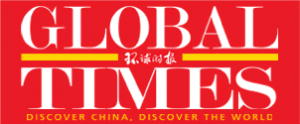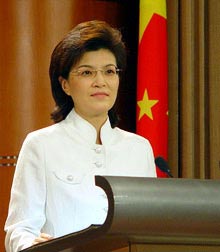Translation: China’s Global Times Responds to News of U.S. Arm Sales to Taiwan
China’s response to reports that the U.S. will sell arms to Taiwan has been swift, with an official response
coming within 24 hours of the first U.S. news articles. As reported in the English language edition of the state-run Global Times, Chinese Foreign Ministry spokeswoman Jiang Yu (pronounced Geeang You) not surprisingly reiterated China’s strong opposition to arm sales to Taiwan and called on the U.S. to stop its intended actions. China’s response offers an interesting glimpse into how the government and the Party often use the media to respond to crises.
The English language editions of China’s newspapers never tell the full story and usually are written with China’s foreign audience in mind, presenting a peaceful, soft and conciliatory China. But if the English language editions are politically correct vis-à-vis the Western world, the Chinese language editions of the same newspapers answer to the political correctness of the Chinese market, presenting an image of China that is often bolder, stronger and less forgiving, but at the same time the victim of Western (usually U.S.) aggression.
In reporting on the proposed U.S. arm sales to Taiwan, the Global Times continued with this Jekyll and Hyde approach, providing more detail in their Chinese language edition. Below we translate one of two (and the more interesting) articles that appeared in Friday’s Global Times.
The Global Times, an uber-nationalist newspaper, has very strong connections to the Chinese government and the Chinese Communist Party and at times, the CCP uses the Global Times to inform the public on the subtleties of some of their policies (see Susan Shirk, China: Fragile Superpower, p. 86-87). Thus, the Global Times is not objective journalism; in reporting on international issues, it is communicating the views of the Party. Because it is the mouthpiece of the Party, the article translated below shows the Chinese government’s likely response to U.S. arm sales to Taiwan, and it does not look particularly good for the U.S. if it should go forward with its plan.
 The Experts: If the U.S. Sells Arms to Taiwan, it Must Face Strong Retaliation and Sanctions from China
The Experts: If the U.S. Sells Arms to Taiwan, it Must Face Strong Retaliation and Sanctions from China
The Global Times (Chinese Edition) – Click Here for original article
December 11, 2009
Translation by China Law & Policy
According to a December 9 Reuters news report, an American government official leaked publically the Obama Administration’s new plan to sell arms to Taiwan, including a plan to sell submarines and black hawk helicopters. The American State Department as well as the Defense Department have been unwilling to discuss this news, but the media generally been stating that American arms sales to Taiwan “is now only a matter of time.”
China military expert Dai Xu [pronounced Dye Sue] believes that China must oppose arm sales to Taiwan and make those countries who sell arms to Taiwan pay a serious price. He personally recommends that China should continue verbally protesting the U.S.’s actions and should also include some sort of substantive retaliation – an eye for an eye – sell arms to the U.S.’s latent opponents. National Defense University Professor, Meng Yangqing [pronounced Mong Yang-ching] believes that China has never harmed the U.S.’s core interests, but America, by selling arms again to Taiwan, has harmed China’s core interests; the U.S. should not take China’s past conciliatory response [to arm sales to Taiwan] as a sign of weakness or cowardness. This time, China should not just use strong language and diplomacy to respond, but should also conduct actions of retaliation and sanctions.
China’s People’s University Professor Jin Canrong [pronounced Gin Tsan-rung] believes that if the U.S. sells arms to Taiwan, then China should certainly seek to retaliate and sanction the U.S. In regards to military affairs, China could cut off military relations. For the U.S., that would be a very difficult situation. Of the world’s six strongest militaries – the U.S., Russia, China, Europe, Japan and India – the U.S. knows’ the inside story on the Russian military, it controls the European and Japanese militaries, looks down upon the Indian military, but is the most worried about China’s People’s Liberation Army (PLA) and the U.S. most urgently wants to better understand the PLA.
 On Facebook
On Facebook By Email
By Email 
